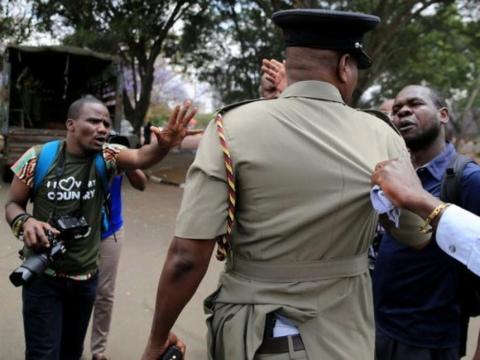Police, Army, a Major Threat to Media Freedom in Kenya during Elections
 Submitted by jbimokola on
Submitted by jbimokola on

Full multimedia story at https://kawesiyasini.wordpress.com/2018/06/22/police-army-a-major-threat-to-media-freedom-in-kenya-during-elections/
Kenyan police and the army have been a beleaguered threat to Journalists when reporting on pre and post-election demurrals and following house-to-house raids conducted by the Kenyan police.
According to Kenya’s newspaper “The Star”, a number of journalists were harassed by police and the army during and after general elections in 2017, and had their cameras and equipment confiscated.
Duncan Khaemba a KTN senior journalist says that when he was reporting on post-election violence against protestors in the Kibera slums of Nairobi on Saturday 12 August, the police and the army arrested him and his Cameraman Otieno Willis. They were accused of wearing unlicensed bullet proof gear, including vests and protective helmets. Despite possessing copies of the import license, police wrongfully insisted that original versions were necessary and took both men into custody.
“They told me to stop covering demonstrations about the general elections and even threatened me that when I keep on reporting on such events, they will close the media house am working for,” says Khaemba
According to a report from the organization called ARTICLE 19, Media freedom in Kenya was clearly in decline in 2017. Political instability around disputed elections in August, which saw mass protests met by excessive use of force by police and the army which was accompanied by dozens of violations against journalists and media workers trying to report on political issues and protests.
Journalists who covered the 2017 general elections worked in an exceptionally challenging environment. Attacks against them showed a marked rise in severity and in numbers during elongated elections period that saw journalists face physical attacks, arrest, being denied access to areas, and receiving various forms of threats, even more so after the August Elections and in the run up to the October repeat presidential poll.
In addition to harassment and attack, journalists have fallen prey to intimidation and censorship when reporting on elections, often by government entities. Already, the 2013 Kenya Information and Communication Act (KICA), which threatens journalists and media companies with fines for breaching a code of conduct laid out by legislators, is seen by many as a way to limit the freedom of media while reporting on general elections.
The Kenya Broadcasting Corporation (KBC) reporter Simon Achola confirms that security personnel took his phone and deleted his photos of Kenyans who were striking against the inefficient of the Kenyan Electoral Commission claiming that it failed to organize free and fair elections.
According to Dennis Itumbi, Secretary of Innovation, Digital and Diaspora Communication in the Office of the President of the Republic of Kenya says that journalists are arrested when they have committed crimes. “There is no crush between the police and journalists who behave professionally while doing their work. But once they go against the law, we use security organs like police and the army to deal with them.”
It should be noted that, the act of brutalizing and harassing journalists in Kenya started far back in 2007 following the controversial 2007 presidential election, which saw President Mwai Kibaki declared the winner over Laila Odinga, caused two months of fighting that left over 1,000 people dead and up to 500,000 internally displaced.
Journalists were denied a chance by the Police and the Army to cover countless actions which was happening by that time in Kenya. Those journalists who defied the orders for the security organs were threatened, beaten and harassed and finally arrested.
Our move to have the stand of the police about how security organs treat journalists during and after general elections was in futile because none of the security spokesperson wanted to take to us.
- Log in to post comments
- 1644 reads
